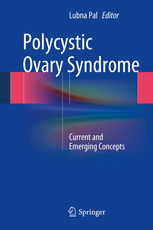Presenting an overview of the current understanding of the pathophysiology of PCOS and a paradigm for the clinical
evaluation and management of the disorder, Polycystic Ovary Syndrome is written in an easy to digest, concise format
that, with bulleted key points introducing each chapter, is suitable for the trainee and the busy clinician. The
breadth and depth of coverage of today뭩 queries and controversies will be of particular interest to the specialist
and researcher. An international group of leading experts addresses the varied etiologies of PCOS, comprehensively
covering the contemporary treatment approaches and long-term implications of PCOS, a common yet poorly understood
disorder. Chapters on treatment will be of particular relevance to the clinician and the trainee as they cover
conventional therapies, lifestyle, and diet, as well as address emerging strategies such as the use of statins and
surgery in PCOS management.
Spanning the breadth of clinical presentations and morbidities related to the diagnosis of PCOS, Polycystic Ovary
Syndrome is an exceptional resource for primary care providers, gynecologists, reproductive endocrinologists, and
others involved in the care of these patients, and provides the essential tools to aid clinicians in initiating a
timely diagnostic workup and appropriate interventions to address both the immediate and long-term sequelae related to
PCOS.
Table of contents (19 chapters)
Diagnostic Criteria and Epidemiology of PCOS
Burks, Heather R. (et al.)
Pages 3-10
Polycystic Ovarian Syndrome: A Diagnosis of Exclusion
Wolf, Jennifer (et al.)
Pages 11-26
Recent Advances in the Genetics of Polycystic Ovary Syndrome
Jones, Michelle R. (et al.)
Pages 29-52
Ovarian Dysfunction in Polycystic Ovary Syndrome
Mason, Helen D. (et al.)
Pages 53-70
The Role of the Adrenal Glands in the Hyperandrogenism Associated with Polycystic Ovarian Syndrome
Freeman, Ruth
Pages 71-80
The Hypothalamic뻇ituitary Axis in PCOS
Gill, Sabrina (et al.)
Pages 81-93
Insulin Resistance and Lipotoxicity in PCOS: Causes and Consequences
Bellanger, Sylvain (et al.)
Pages 95-115
Obesity, Metabolic Dysfunction, and Inflammation in Polycystic Ovary Syndrome
Aubuchon, Mira (et al.)
Pages 117-144
Role of Lifestyle and Diet in the Management of Polycystic Ovarian Syndrome
Krystock, Amy
Pages 147-164
Role of Insulin-Sensitizing Drugs in PCOS Management
Awwad, Johnny T. (et al.)
Pages 165-180
Role of Statins in PCOS Management
Ortega, Israel (et al.)
Pages 181-203
Managing PCOS-Related Infertility: Ovulation Induction, In Vitro Fertilization, and In Vitro Maturation
Torrealday, Saioa (et al.)
Pages 205-221
Managing the PCOS-Related Symptoms of Hirsutism, Acne, and Hair Loss
McAvey, Beth (et al.)
Pages 223-242
PCOS in Adolescence: Diagnostic Dilemmas and Management Considerations
Burgert, Tania S.
Pages 245-264
Considerations and Challenges for Pregnancy in Polycystic Ovary Syndrome
Han, Christina Shih-chi (et al.)
Pages 265-274
Role of Surgery in the Management of PCOS: Rationale and Considerations for Bariatric Surgery
Escobar-Morreale, H?tor F.
Pages 277-288
Surgical Management of Polycystic Ovary Syndrome: A Contemporary Viewpoint on Place of Ovarian Surgery in PCOS
Management
Leonard, Phoebe H. (et al.)
Pages 289-299
Long-Term Morbidity: Cardiovascular Disease, Cancer, and Depression in PCOS
Milman, Lauren W. (et al.)
Pages 303-316
Emerging Concepts: Role of Vitamin D Deficiency in the Pathogenesis of PCOS
Lathief, Sanam (et al.)
Pages 317-331


